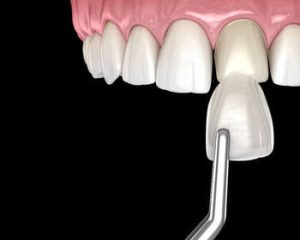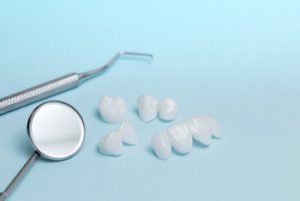Veneers are often the go-to option for many people when it comes to attaining a bright, even smile. However, not everyone is keen on this cosmetic dental procedure, which involves the removal of some of the natural tooth enamel to apply thin shells of porcelain or composite resin. The good news is that if veneers aren’t your ideal choice, plenty of other dental veneer alternatives can deliver a stunning smile without the need for extensive tooth alteration. This blog will explore these alternatives to veneers, their benefits, and how they compare to traditional porcelain veneers. Whether you’re looking to address minor cosmetic issues, fix chipped or misaligned teeth, or brighten up your smile, there’s a solution out there for you.
Who Are the Ideal Candidates for Dental Veneers?
Veneers are a highly popular cosmetic dental treatment, offering patients a way to dramatically enhance the appearance of their smile. However, not everyone is an ideal candidate for this procedure. Veneers are a significant investment and require some permanent changes to the natural tooth structure, so it’s essential to understand whether this treatment is the best option for you.
If you’re considering veneers, you’ll want to ensure you’re a good candidate for the procedure. Here are some of the key characteristics that make someone a suitable candidate for veneers:
Patients with Cosmetic Dental Issues
Veneers are designed to address a wide variety of cosmetic dental issues, making them an excellent option for people who want to enhance the appearance of their teeth. Suitable candidates often have concerns like:
- Discoloured Teeth: If tooth whitening treatments haven’t been successful in removing deep stains or discolouration, veneers can provide a lasting solution by covering the stained teeth with a bright, even surface.
- Chipped or Cracked Teeth: Those with chipped teeth or small cracks that don’t affect the structural integrity of the tooth may benefit from veneers, as the porcelain or composite resin material can seamlessly cover these imperfections.
- Minor Alignment Issues: If you have slightly misaligned teeth but refuse to undergo orthodontic treatment, veneers can give the appearance of straighter teeth by reshaping the tooth surface.
- Gaps Between Teeth: Veneers are an excellent solution for closing small gaps between teeth, giving the illusion of a straighter smile.
Individuals Looking for Long-Term Results
A major advantage of porcelain veneers is their durability, making them a long-term solution for improving your smile. These veneers are highly resistant to stains and, with good care, can last from 10 to 15 years. This makes them an ideal choice for individuals who are dedicated to maintaining the appearance of their smile for years to come.
Patients with Healthy Teeth and Gums
It’s essential to have a healthy foundation before getting veneers. Ideal candidates should have:
Good Oral Health: Healthy natural teeth, free from tooth decay or gum disease, are crucial. Veneers are not designed to address underlying dental health issues. Your dentist will need to ensure that your teeth and gums are in good condition before proceeding with the veneer application.
- Enough Enamel: Veneers require the removal of a small amount of natural tooth enamel to create room for the veneer to adhere properly. Patients with enough enamel on their teeth are typically better candidates, as this allows for a secure and stable fit.
Patients with Realistic Expectations
Veneers can create a dramatic transformation, but it’s important to have realistic expectations about the procedure. Suitable candidates understand that:
- Veneers Are Irreversible: The process involves enamel removal, which means that once you choose to get veneers, you will always need to maintain or replace them.
- Long-Term Maintenance Is Required: Although porcelain veneers are durable, they still require regular care, including good oral hygiene and regular dental check-ups.
- Not a Solution for Severe Dental Issues: Veneers are a cosmetic solution and cannot address more serious dental concerns, such as large cavities, advanced gum disease, or severely weakened teeth.
Who Is Not a Suitable Candidate for Veneers?
While veneers are a fantastic option for many people, some individuals may not be ideal candidates for this procedure. Here are some reasons why veneers may not be suitable for you:
Patients with Poor Oral Health

Severely Decayed Teeth: Teeth with significant decay or damage may not be strong enough to support veneers. In these situations, dental crowns may be a more suitable alternative.
In these situations, dental crowns may be a more suitable alternative, as they cover the entire tooth and provide more protection and reinforcement.
Gum Disease: Inflamed or infected gums are not stable enough to support veneers. You’ll need to undergo treatment to restore gum health before considering this cosmetic procedure.
Patients with Bruxism (Teeth Grinding)
If you have bruxism, or chronic teeth grinding, veneers may not be a suitable option for you. The act of grinding can place significant pressure on veneers, leading to chips, cracks, or even complete breakage. Although there are protective solutions like night guards that can mitigate some of these risks, it’s important for individuals with bruxism to consult their dentist to determine if veneers are the right choice for their dental needs.
Individuals with Insufficient Tooth Enamel
As mentioned earlier, the application of veneers requires some removal of tooth enamel to make space for the veneer material. If you have already experienced enamel erosion or have naturally thin enamel, you may not have enough of a base for the veneers to bond properly. Patients with compromised enamel may be better suited for composite bonding or other less invasive treatments that don’t require as much tooth preparation.
Patients Looking for a Quick Fix for Severe Orthodontic Issues
While veneers can provide the appearance of a straighter smile, they are not a substitute for orthodontic treatment. Patients with severely misaligned teeth, overbites, or underbites are not good candidates for veneers as these issues go beyond cosmetic concerns. Veneers cannot correct bite problems or straighten teeth that are significantly crooked. In such cases, metal braces or clear aligners like Invisalign are more suitable treatment options.
Patients Unwilling to Commit to Long-Term Care
Veneers, particularly porcelain veneers, require a long-term commitment to care and maintenance. While they are relatively low-maintenance compared to other cosmetic treatments, patients must be willing to:
- Maintain Good Oral Hygiene: Daily brushing, flossing, and regular dental visits for check-ups are crucial for keeping your veneers and natural teeth healthy.
- Avoid Bad Habits: Chewing on hard objects, biting your nails, or opening hard items with your teeth can damage veneers, and those prone to such habits may not be ideal candidates.
- Periodic Replacements: Veneers do not last forever and will need to be replaced after 10-15 years, depending on wear and tear.
If you’re unsure about committing to long-term care or want a more temporary solution, veneers might not be the best choice for you.
Why Seek an Alternative to Veneers?
Veneers offer a beautiful transformation for your smile, but they aren’t for everyone. Some individuals hesitate because of the irreversible process of enamel removal or the cost involved with traditional porcelain veneers. Others may prefer a less invasive approach to retain more of their natural tooth structure. Veneers are great, but they aren’t the only option available. You can still achieve a bright, healthy smile with alternative treatments that preserve your natural teeth and fit your lifestyle and budget.
Let’s dive into some of the affordable alternatives to veneers that offer fantastic cosmetic results.
Dental Bonding: A Quick Fix for Minor Imperfections
A highly popular alternative to veneers is dental bonding. This procedure uses a composite resin material that is applied directly to your teeth to conceal imperfections like chipped teeth, stained teeth, and small gaps. It is a fast and minimally invasive treatment that can enhance your smile in just one visit to your cosmetic dentist.
Why Dental Bonding?
- Preserve Natural Tooth Structure: Unlike veneers, which require the removal of some of your natural tooth enamel, dental bonding keeps your teeth intact.
- Affordable Alternative: Bonding is a more budget-friendly option than porcelain veneers.
- Minimal Discomfort: The procedure is typically tolerable and does not usually require anaesthesia.
- Natural Appearance: The composite resin used can be colour-matched to your existing teeth for a seamless look.
Whether you’re dealing with minor cosmetic issues or have a few damaged teeth, dental bonding is an effective way to improve the appearance of your teeth without the commitment that comes with veneers.
Teeth Whitening: Brighten Your Smile Without Altering Your Teeth
If your primary concern is stained or yellow teeth, you might not need veneers at all. Professional teeth whitening or tooth whitening treatments can significantly improve the brightness of your smile without altering the natural tooth structure.
Why Consider Teeth Whitening?
- Non-Invasive: Unlike veneers or bonding, whitening procedures do not change the structure of your natural teeth.
- Quick and Effective: A professional tooth whitening treatment at your dentist’s office can often whiten your teeth several shades in a single visit.
- Preserve Natural Enamel: Whitening treatments work on the tooth surface and don’t require any enamel removal.
- Affordable: Compared to veneers, tooth whitening is a more affordable alternative that can give you a brighter smile.
Tooth whitening is an ideal choice if you’re happy with your teeth’s overall shape and health but want to brighten their appearance. While it won’t fix misaligned teeth or other imperfections, it’s perfect for removing surface stains.
Dental Crowns: For More Severe Dental Issues
For individuals with severely decayed teeth or significant damage, a more robust solution like dental crowns might be necessary. Crowns cover the entire tooth, restoring both its function and appearance. Unlike veneers, which only cover the front surface, crowns are designed to protect and reinforce a damaged or weakened tooth.
Why Choose Dental Crowns?
Full Tooth Protection: Crowns offer full coverage, making them suitable for more extensive issues like broken teeth, tooth decay, or a severely decayed tooth.
- Strength and Durability: Crowns are made from materials like porcelain or metal that provide long-lasting durability.
- Restores Function: Crowns not only enhance the appearance of your teeth but also restore their ability to function, making them a versatile cosmetic dental treatment.
- Natural Appearance: With modern materials, crowns can be colour-matched to your teeth for a natural look, much like veneers.
If you’re dealing with more significant dental imperfections or require both functional and aesthetic improvements, dental crowns might be the best alternative to veneers for you.
Orthodontic Treatment: Straighten Teeth Without Veneers
If your primary concern is crooked teeth or misaligned teeth, then orthodontic treatment is the most effective and long-term solution. While traditional veneers can give the appearance of straight teeth, they don’t correct the underlying alignment issues. Orthodontic treatments such as metal braces or clear aligners like Invisalign can straighten your teeth over time without the need for any tooth alteration.
Why Orthodontics?
- Health Benefits: Straightening your teeth can also fortify your dental health, and aligned teeth are easier to clean and maintain.
- Customisable Options: From traditional braces to clear aligners, there are many options to fit your needs and preferences.
- No Alteration to Natural Teeth: Orthodontic treatment straightens your teeth without requiring any changes to the natural tooth structure. Your teeth remain intact, making it a more conservative approach than veneers.
- Long-Lasting Results: Once your teeth have been straightened through orthodontics, the results can endure a lifetime with the right care and the use of retainers.
- Better for Dental Health: Straightening your teeth can improve your overall dental health, making it easier to clean and care for your teeth. This can minimise the risk of tooth decay, gum disease, and tooth enamel erosion.
If you’re more concerned about alignment than cosmetic imperfections, orthodontic treatment might be the most effective alternative to veneers for you.
Composite Veneers: A Less Invasive Veneer Alternative
For those who still want the look of veneers without the invasive procedure or high cost, composite veneers could be a great alternative. Composed of composite resin material, these veneers are applied directly to the natural tooth surface, much like dental bonding, but they provide a more veneer-like finish for enriched cosmetic results.
Why Composite Veneers?
- More Affordable: Composite resin veneers are typically less expensive than porcelain veneers.
- Less Enamel Removal: Composite veneers require minimal preparation compared to traditional veneers.
- Customisable: These veneers can be sculpted and shaped to match your natural tooth shape for a natural appearance.
- Quick Procedure: The process of applying composite veneers is generally quicker than that of applying porcelain veneers.
If you’re seeking a more budget-friendly veneer option that still offers fantastic results, composite resin veneers might be the perfect fit.
Maintaining Your Smile: Good Oral Hygiene and Regular Dental Visits
Regardless of which cosmetic procedure or alternative to veneers you choose, maintaining good dental health is crucial for preserving a bright and healthy smile. Simple habits like regular brushing and flossing, along with professional cleanings from your dental professional, can help prolong the life of your cosmetic dental treatments.
Why Oral Hygiene Matters
- Prevent Tooth Decay: Good oral hygiene helps prevent tooth decay, which can undermine any cosmetic improvements you’ve made.
- Protect Natural Teeth: Whether you choose bonding, whitening, or crowns, keeping your natural teeth healthy is key to long-term success.
- Enhance Results: By maintaining good dental health, you can ensure that your cosmetic results, whether from bonding, whitening, or other treatments, last as long as possible.
Conclusion: Choose the Best Option for Your Smile

Whether you choose dental bonding, composite veneers, or another affordable alternative, your journey to a brighter, more confident smile can start today. For more information or to schedule a consultation, contact Infinity Dental Care at (02) 9159 6237.
References:
NHS. (n.d.). Orthodontics. NHS. https://www.nhs.uk/conditions/orthodontics/
Healthline. (n.d.). Dental veneers: Pros, cons and procedure. Healthline. https://www.healthline.com/health/dental-veneers
WebMD. (n.d.). Dental crowns: Purpose, procedure, complications, care. WebMD. https://www.webmd.com/oral-health/dental-crowns
Forbes. (n.d.). Professional teeth whitening: Costs, options and safety. Forbes Health. https://www.forbes.com/health/dental/professional-teeth-whitening/
Cleveland Clinic. (n.d.). Cosmetic dentistry: What it is, procedures & types. Cleveland Clinic. https://my.clevelandclinic.org/health/treatments/23914-cosmetic-dentistry


 Full Tooth Protection:
Full Tooth Protection: